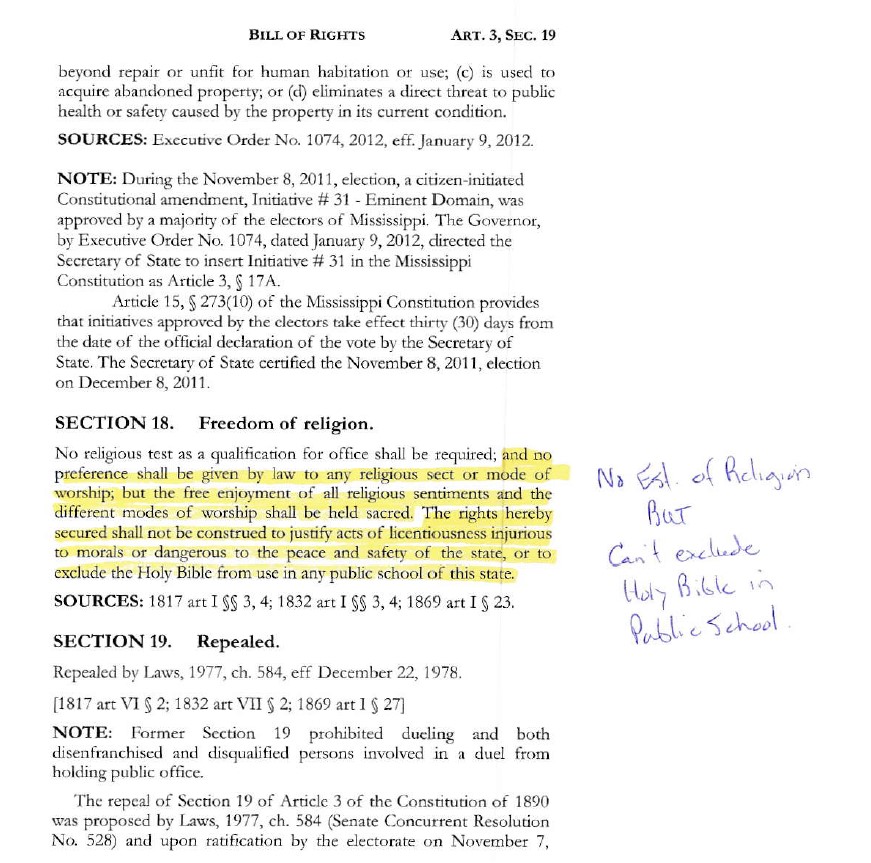Echoes of the Past: The Mississippi Constitution from 1890 to Present
The constitution gets ratified, except when it doesn’t.
Remarkably, Mississippi still operates under its 1890 Constitution—a document which was never ratified by Mississippi citizens. Instead, the state organized a constitutional convention of 134 male members, only one of whom was Black. The rest were white.
If this seems discriminatory, it’s because it was. Constitutional convention president at the time, Saladin Calhoon, openly admitted the convention’s intentions: “Let’s tell the truth if it bursts the bottom of the universe. We came here to exclude the Negro. Nothing short of this will answer.”
A Black Majority and the Mississippi Plan
Roger G. Shafford of the “Washington Post” describes Calhoon’s rhetoric as reflective of a “Mississippi Plan” to disenfranchise Black Mississippians. At the time, Black people constituted a majority of voters in Mississippi under recent federal Reconstruction amendments.
“Mississippi’s 1890 convention sought to find a way around the 15th Amendment to the Constitution, which gave African Americans the vote,” writes Shafford.
The convention responded to statewide pressure for a new constitution. Per the “Mississippi Encyclopedia,” post-Reconstruction Mississippi had been relying “on an awkward truce among multiple political parties and between the races.” This involved cooperation between Black and white counties, tolerance of Black suffrage and allowance for Black people to hold low-level political offices.
These apparently progressive changes were frightening to the white elite, who worried they could be overpowered by Black Mississippians’ newfound political voice. Many white Mississippians fretted that such influence would “corrupt” the next generation.
Thus, the Mississippi Constitutional Convention of 1890 convened, all for the purpose of disenfranchising Black Mississippians.
The 1890 Constitution
How did Mississippi dodge the Fifteenth Amendment? They simply added new requirements.
Per the original 1890 Mississippi Constitution, the following are examples of people who could not vote in elections:
- Women
- Anyone who failed to pay a 2 to 3 dollar poll tax, provided he was not deaf, blind, mute or “maimed” in some way
- Anyone who failed to pass a literacy test
- Anyone whose grandfather could not vote prior to the Civil War
- “Idiots, insane persons, and Indians not taxed”
Put into practice, these new restrictions would target potential Black voters. Shafford notes in his article how white men were often asked simple questions to determine their voting eligibility, while Black men were confronted with such difficult questions as, “How many bubbles were in a bar of soap?” The poll tax, meanwhile, targeted the economically disadvantaged status of Black Mississippians.
Regarding the “grandfather clause,” it is noteworthy that the grandfather of any Black Mississippian at the time would have been a slave before the Civil War and, therefore, ineligible to vote. White Mississippians did not face this issue.
Responding to allegations of racist discrimination, one Mississippi senator argued, “I deny that the educational test was intended to exclude Negroes from voting…the sole purpose was to exclude persons of both races who from want of intelligence are unsafe depositors of political power. That more Negroes would be excluded is true…but that is not our fault.”
Nevertheless, registration of Black voters dropped from 90 percent at the time of Reconstruction to below 6 percent by 1892.
The Mississippi Constitution Today
In Mississippi, it is easier for convicted felons to achieve legal access to a firearm than it is reinstate their voting rights.
In time, the original 1890 constitution would be significantly amended—for one thing, changing its use of “white rule” to “intelligent rule”—but its impact is still felt across the state. According to the Southern Poverty Institute, Mississippi’s lifelong voting ban on certain convicted felons has led to 1 in 6 Black citizens being denied the ballot.
Local defense attorney and Delta State adjunct professor Michael Carr commented on the provision, stating, “It’s an incredibly large amount of people [that the ban affects]. That dilutes people’s ability to make change.”
“I have been practicing law for seventeen years, and the majority of my practice has been representing people accused of crimes,” Carr explains. “None of my clients have ever asked me to try to get their voting rights reinstated. Not once. . . . Which is sad, because people fought and died for the ability to vote in this country.”
“But I always have people come back and ask to restore their gun rights. . . . If you are a convicted felon [in Mississippi], you permanently lose your right to vote. . . . You do not permanently lose your right to possess a firearm.”
In Mississippi, then, it is easier for convicted felons to achieve legal access to a firearm than it is reinstate their voting rights—voting rights that were revoked under a constitution explicitly intended “to exclude the Negro.”
But Wait, There’s More
Mississippi’s restrictions on felons have other impacts. The state’s constitution mandates that, when an individual is out on bond for one crime but charged with another, they must be held in prison without a chance at bond until one of the cases is resolved. This is regardless of the severity of the first and/or second charge.
Importantly, however, there is no timeframe stipulated in which a law agency must indict someone, nor is there any requirement that law enforcement must inform those under investigation about the status of their case. A Mississippi citizen could potentially go years without any action taken on their first offense or information on the case before they are charged a second time.
“They’re already living on the edge of poverty and society anyway,” Carr says of low-income Mississippians (often minorities), who tend to be singled out by this process. “And then they get arrested for something else and then they lose everything. And they’re held with no bond, so they become a ghost in the hallway of the jail. . . . It’s hard to get their cases resolved because sometimes you have to ‘dust off’ that burglary from four years ago.”
While felony itself can lead to permanent disenfranchisement, even a charge can have lasting impacts on those in Mississippi coming from socioeconomically disadvantaged backgrounds. All these impacts are based on provisions in the current Mississippi Constitution.
Controversy and Response
Mississippi is one of only 3 states to have such stringent voting restrictions on felons. Because of the ban’s potentially racist undertones, it has become a topic of controversy.
In August 2022, the U.S. Fifth Circuit Court of Appeals affirmed the provision’s legality. Mississippi Attorney General Lynn Fitch’s office defended the decision in a statement, “We are pleased with the court’s decision. As the court noted, ‘Plaintiffs’ proposal that a state constitutional amendment must be voted on word for word to avoid any vestigial race taint is radically prescriptive.”
Journalist Bobby Harrison argues in “Mississippi Today,” however, that Mississippians “never got an opportunity to vote on whether they wanted to remove the racist language. Legislature voted to put on the ballots in the 1950s and 60s language eliminating burglary and adding murder and rape as disenfranchising crimes.”
He continues, “No matter how citizens voted on those amendments, the bulk of the constitutional provision would remain in place.”
Looking Forward
The Mississippi Center for Justice has now asked the United States Supreme Court to evaluate Mississippi’s felon voting ban. The “taint of racism”—mentioned by Fitch’s office, referenced in the majority ruling of the Fifth Circuit Court of Appeals and dating all the way back to 1890—may very well have national impact.

Kelly Foster has lived in Flowood, Miss., ever since her family moved there from Brandon, Miss., when she was 15 years old. She enjoys going to restaurants,...



